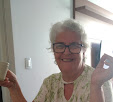I'LL BE SEEING YOU
BILLIE HOLLIDAY
SONGWRITERS: FAIN SAMMY & IRVING KAHAL
COUNTRY: U.S.A.
ALBUM: I1LL BE SEEING YOU
LABEL: BLUEBIRD/RCA VICTOR
GENRE: JAZZ
YEAR: 1938
"I'll
Be Seeing You" is a popular song about nostalgia, with music by Sammy Fain
and lyrics by Irving Kahal. Published in 1938, it was inserted into the Broadway
musical Right This Way, which closed after fifteen performances. The title of
the 1944 film I'll Be Seeing You was taken from this song at the suggestion of
the film's producer, Dore Schary. The song is included in the film's soundtrack. The
earliest recording of the song was by Dick Todd in 1940 on the Bluebird label.
The
resemblance between the main tune's first four lines and a passage within the
theme of the last movement of Gustav Mahler's Third Symphony(1896) was pointed
out by Deryck Cooke in 1970. Mahler may have derived this passage from the
overture to Daniel Auber's comic opera (Marco Spada (1852).
Billie
Holiday's 1944 recording of the song was the final transmission sent by NASA to
the Opportunity rover on Mars when its mission ended on 13 February 2019
I'll Be
Seeing You is a 1944 American drama film made by Selznick International
Pictures, Dore Schary Productions, and Vanguard Pictures, and distributed by United
Artists. It stars Joseph Cotten, Ginger Rogers, and Shirley Temple, with Spring
Byington, Tom Tully, and John Derek. George Cukor was the original director,
but was replaced by William Dieterle. It was produced by Dore Schary, with David
O. Selznick as executive producer. The screenplay was by Marion Parsonnet,
based on a radio play by Charles Martin.
The
soundtrack includes the song "I'll Be Seeing You", which had become a
hit that year, although it dated back to 1938. The film's title was taken from
the song, at the suggestion of Schary.
Eleanora
Fagan(April 7, 1915 – July 17, 1959), professionally known as Billie
Holiday, was an American jazz singer with a career spanning nearly thirty
years. Nicknamed "Lady Day" by her friend and music partner Lester
Young, Holiday had a seminal influence on jazz music and pop singing. Her vocal
style, strongly inspired by jazz instrumentalists, pioneered a new way of
manipulating phrasing and tempo. She was known for her vocal delivery and
improvisational skills.
After a
turbulent childhood, Holiday began singing in nightclubs in Harlem, where she
was heard by the producer John Hammond, who commended her voice. She signed a recording
contract with Brunswick in 1935. Collaborations with Teddy Wilson yielded the
hit "What a Little Moonlight Can Do", which became a jazz standard.
Throughout the 1930s and 1940s, Holiday had mainstream success on labels such
as Columbia and Decca. By
the late 1940s, however, she was beset with legal troubles and drug abuse. After
a short prison sentence, she performed at a sold-out concert at Carnegie Hall,
but her reputation deteriorated because of her drug and alcohol problems.
She was a successful concert performer throughout the
1950s with two further sold-out shows at Carnegie Hall. Due to personal
struggles and an altered voice, her final recordings were met with mixed
reaction, but were mild commercial successes. Her final
album, Lady in Satin, was released in 1958. Holiday died of cirrhosis on July
17, 1959.
She won
four Grammy Awards, all of them posthumously, for Best Historical Album. She
was inducted into the Grammy Hall of Fame in 1973. Lady Sings the Blues, a film
about her life, starring Diana Ross, was released in 1972. She is the primary
character in the play (later made into a film) Lady Day at Emerson's Bar and
Grill; the role was originated by Reenie Upchurch in 1986, and was played by Audra
McDonald on Broadway and in the film. In 2017 Holiday was inducted into the National
Rhythm & Blues Hall of Fame.
I'll be seeing you
In all the old familiar places
That this heart of mine embraces
All day and through
In that small cafe
The park across the way
The children's carousel
The chestnut trees, the wishing well
I'll be seeing you
In every lovely summer's day
In everything that's light and gay
I'll always think of you that way
I'll find you in the morning sun
And when the night is new
I'll be looking at the moon
But I'll be seeing you
I'll be seeing you
In every lovely summer's day
In everything that's light and gay
I'll always think of you that way
I'll find you in the morning sun
And when the night is new
I'll be looking at the moon
But I'll be seeing you.







0 comentários:
Postar um comentário